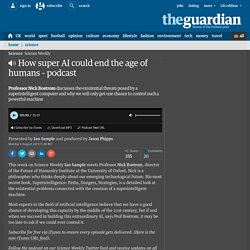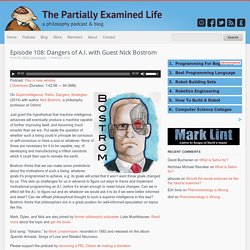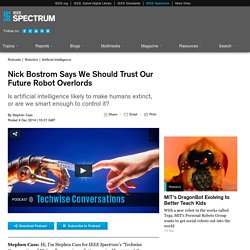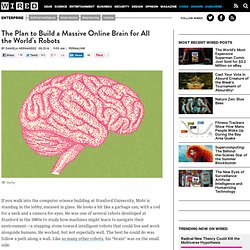

CS188. How super AI could end the age of humans – podcast. This week on Science Weekly Ian Sample meets Professor Nick Bostrom, director of the Future of Humanity Institute at the University of Oxford.

Nick is a philosopher who thinks deeply about our emerging technological future. His most recent book, Superintelligence: Paths, Dangers, Strategies, is a detailed look at the existential problems connected with the creation of a superintelligent machine. Most experts in the field of artificial intelligence believe that we have a good chance of developing this capacity by the middle of the 21st century, but if and when we succeed in building this extraordinary AI, says Prof Bostrom, it may be too late to ask if we could ever control it. Episode 108: Dangers of A.I. with Guest Nick Bostrom. Podcast: Play in new window | Download (Duration: 1:42:56 — 94.3MB) On Superintelligence: Paths, Dangers, Strategies (2014) with author Nick Bostrom, a philosophy professor at Oxford.

Just grant the hypothetical that machine intelligence advances will eventually produce a machine capable of further improving itself, and becoming much smarter than we are. Put aside the question of whether such a being could in principle be conscious or self-conscious or have a soul or whatever. None of those are necessary for it to be capable, say, of developing and manufacturing a trillion nanobots which it could then use to remake the earth. Bostrom thinks that we can make some predictions about the motivations of such a being, whatever goals it’s programmed to achieve, e.g. its goals will entail that it won’t want those goals changed by us.
Mark, Dylan, and Nick are also joined by former philosophy podcaster Luke Muehlhauser. Please support the podcast by becoming a PEL Citizen or making a donation. Nick Bostrom Says We Should Trust Our Future Robot Overlords. Stephen Cass: Hi, I’m Stephen Cass for IEEE Spectrum’s “Techwise Conversations.”

We’ve all seen science fiction movies like 2001: A Space Odyssey and The Matrix, where the villain is an artificial intelligence program that has gone rogue. These killer AI scenarios have provided entertainment at the cinema for decades, but some scientists are now warning that we need to take the AI threat very seriously. There’s a new book out by the Oxford University philosopher Nick Bostrom that explores this threat in great detail. Bostrom directs Oxford’s Future of Humanity Institute, and he studies all the ways the human species could be wiped off the planet. In his book, called Superintelligence, he explains how a supersmart AI could arise and destroy us. Eliza, welcome to the podcast. Eliza Strickland: Thanks for having me, Stephen.
Stephen Cass: So, Bostrom has looked at all kinds of disaster scenarios for human extinction, right? Nick Bostrom: We did do a survey of the world’s leading AI experts. The Plan to Build a Massive Online Brain for All the World’s Robots. Getty If you walk into the computer science building at Stanford University, Mobi is standing in the lobby, encased in glass.

He looks a bit like a garbage can, with a rod for a neck and a camera for eyes. He was one of several robots developed at Stanford in the 1980s to study how machines might learn to navigate their environment—a stepping stone toward intelligent robots that could live and work alongside humans. He worked, but not especially well. The best he could do was follow a path along a wall. Now, just down the hall from Mobi, scientists led by roboticist Ashutosh Saxena are taking this mission several steps further. Today, backed by funding from the National Science Foundation, the Office of Naval Research, Google, Microsoft, and Qualcomm, Saxena and his team unveiled what they call RoboBrain, a kind of online service packed with information and artificial intelligence software that any robot could tap into.
Ashutosh Saxena The Dawn of Cloud Robotics. Introduction - TPE sur l'intelligence artificielle. 1) Introduction : - L'Intelligence Artificielle. Le partage 2.0 : les nouveaux consommateurs. 1.

Le travail et l’emploi • Devenir employeur, travailler pour ses voisins Le site Task Rabbit permet d’offrir des services à des particuliers contre rémunération. De petit job à principale source de revenu, Task Rabbit modifie les rapports traditionnels employeurs/employés et monétise l’ensemble des tâches du quotidien. Ce n’est pas le seul site qu’il existe dans le genre : aux Etats-Unis, on trouve aussi Zaarly. • Faire travailler des robots Le développement électronique et mécanique de l’informatique se ressent à plusieurs égard dans le domaine du travail : robots programmables ou télé robotique, les robots sont déjà bien présents dans l’industrie, l’armée et dans les secteurs d’activité à risque.
. • Automatiser le travail du savoir Selon un rapport de l’Institut McKinsey de 2013, les développements technologiques, notamment en termes d’intelligence artificielle, permettrait d’automatiser plusieurs tâches fondées sur un capital de connaissances. . • Travailler chez soi 2. 3. 4.